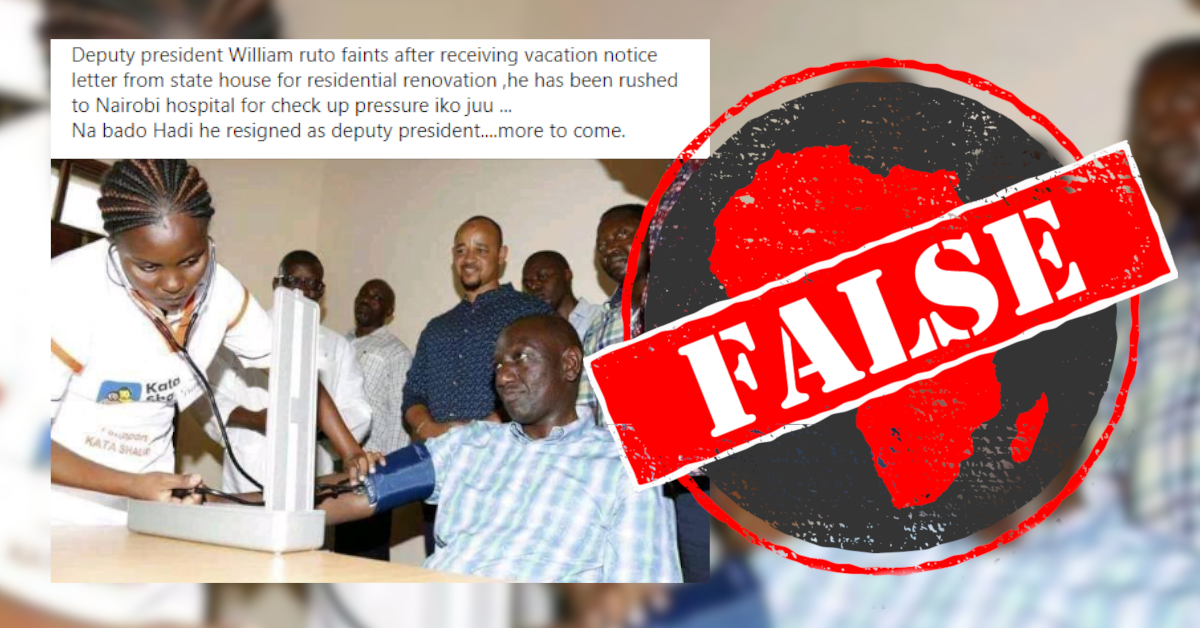A Facebook user posted a photo on 14 May 2020 that he claimed shows Kenya’s deputy president William Ruto in hospital.
The user said Ruto was being checked for high blood pressure which had worsened after being told he had to vacate his official residence.
“Deputy President William Ruto faints after receiving a vacation notice letter from State House for residential renovation ,he has been rushed to Nairobi hospital for check up pressure iko juu,” says the claim. The last part means “he has suffered high blood pressure as a result”.
The post also claimed Ruto had resigned as deputy president.
This was posted days after two senators in the governing Jubilee Party, Kipchumba Murkomen and Susan Kihika, were removed from their positions as senate majority leader and senate majority chief whip. The two are Ruto's political allies.
But does the photo shared on Facebook show Ruto sick in hospital? We checked.

Africa Check debunked the same image in August 2019 after it was used in another false claim.
The photo is in fact from a series of photos posted by the deputy president on his official Facebook account when he opened Lunga Lunga sub-county hospital in Kwale county in August 2016. Kwale county is in southeastern Kenya, south of Mombasa.
At the time Ruto described the photo as showing him being treated after contracting influenza. He also posted photos of his visit on his official Twitter account on the same day.
He captioned the photo: “Opened Lunga Lunga sub-county hospital and became a beneficiary of treatment after a bout of flu. I am grateful to Rhoda Pola who attended to me in Lunga Lunga constituency, Kwale county.”
We contacted David Mugonyi, the deputy president’s communications secretary, who also said the claims on Facebook were untrue. “And you don't need the word probably,” he said.
There have been no other credible reports of the deputy president resigning from his post. – Dancan Bwire
The user said Ruto was being checked for high blood pressure which had worsened after being told he had to vacate his official residence.
“Deputy President William Ruto faints after receiving a vacation notice letter from State House for residential renovation ,he has been rushed to Nairobi hospital for check up pressure iko juu,” says the claim. The last part means “he has suffered high blood pressure as a result”.
The post also claimed Ruto had resigned as deputy president.
This was posted days after two senators in the governing Jubilee Party, Kipchumba Murkomen and Susan Kihika, were removed from their positions as senate majority leader and senate majority chief whip. The two are Ruto's political allies.
But does the photo shared on Facebook show Ruto sick in hospital? We checked.

Image old, posted in 2016
Africa Check debunked the same image in August 2019 after it was used in another false claim.
The photo is in fact from a series of photos posted by the deputy president on his official Facebook account when he opened Lunga Lunga sub-county hospital in Kwale county in August 2016. Kwale county is in southeastern Kenya, south of Mombasa.
At the time Ruto described the photo as showing him being treated after contracting influenza. He also posted photos of his visit on his official Twitter account on the same day.
He captioned the photo: “Opened Lunga Lunga sub-county hospital and became a beneficiary of treatment after a bout of flu. I am grateful to Rhoda Pola who attended to me in Lunga Lunga constituency, Kwale county.”
We contacted David Mugonyi, the deputy president’s communications secretary, who also said the claims on Facebook were untrue. “And you don't need the word probably,” he said.
There have been no other credible reports of the deputy president resigning from his post. – Dancan Bwire
Republish our content for free
For publishers: what to do if your post is rated false
A fact-checker has rated your Facebook or Instagram post as “false”, “altered”, “partly false” or “missing context”. This could have serious consequences. What do you do?
Click on our guide for the steps you should follow.
Publishers guideAfrica Check teams up with Facebook
Africa Check is a partner in Meta's third-party fact-checking programme to help stop the spread of false information on social media.
The content we rate as “false” will be downgraded on Facebook and Instagram. This means fewer people will see it.
You can also help identify false information on Facebook. This guide explains how.


Add new comment